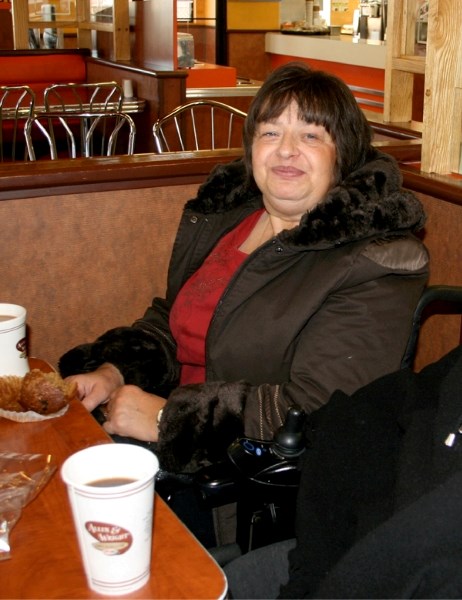Last Thursday, the Multiple Sclerosis Society of Canada set aside $1 million in funding for a clinical trial of a possible new MS treatment, which involves unblocking of neck veins with a procedure that’s been called a liberation treatment. The funds have been set aside so they will be immediately available once the MS pan-Canadian therapeutic clinical trial is developed and approved.
“If the research currently underway warrants pursuing a clinical trial, we want to be able to hit the ground running,” says Neil Pierce, president of the MS Society, Alberta and NWT Division in a press release. “Ensuring funds are available to support a Canadian trial will mean we can get the definitive answers to the questions people touched by MS urgently seek.”
However, for Susie Walchuk, a local resident with MS, the delay in waiting for the data from the scientific research is too long and instead, she is opting to go to a private clinic in Mexico for the procedure, hopefully sometime within the next month.
“I am a secondary progressive and so I am slowly getting worse,” said Walchuk, explaining why she was choosing to go for the procedure. “I have spoken to people who have gone for the treatment and they said it is worth it.”
Walchuk was inspired by the story of a woman from Lamont who recently had the procedure done in Mexico. The Lamont woman reported she felt much better afterwards and was able to do things she couldn’t before.
The therapy involves unblocking narrowed neck veins using a procedure called balloon angioplasty, similar to the one used to widen coronary arteries plugged by a buildup of plaque that can result in heart attacks or strokes. The treatment for MS was developed by Italian vascular specialist Dr. Paolo Zamboni and reports from patients have generated much excitement among MS sufferers throughout the world.
A doctor in Calgary did a scan of Walchuk’s veins and said that he didn’t see any blockages in her jugular veins but did find some blockages in the lower part of her brain. After having discussed the issue with her friend from Lamont, Walchuk has decided to go ahead with the procedure.
She has already contacted a clinic in Tijuana, Mexico and has heard that the privately-owned hospital is very clean and well maintained. The procedure will cost about $13,000, which is not covered by health care. She will fly to San Diego and will travel from there to the hospital for the treatment.
“It’s usually just an overnight thing unless there are complications,” she explained. After the procedure, she will have to remain in her hotel for a few days for follow up check-ups and then she will return to St. Paul.
Other people with MS, such as James Purdy from Bonnyville, are opting to wait for the scientific results from clinical trials before trying the operation.
“I’m definitely interested in it and I’m keeping my eye on all the news but I’m in no rush to get it done right now,” said Purdy.
Purdy is excited about all the research and studies that are being funded and is looking forward to hearing the results from clinical trials. In his opinion, there has been a lot of hype generated by the media, which has brought much needed attention to the issue, but there is just no proof or scientific evidence right now that the procedure is effective.
“I am in relatively good health and the disease has not progressed too far. I am blessed with few symptoms, so I can take the time and find out more information and base my decision on scientific evidence,” said Purdy.
He added that the disease affects people very differently and therefore, deciding to get the treatment is a very personal decision.
According to the press release from the MS society, “Earlier this summer, the Federal Minister of Health accepted the Canadian Institutes of Health Research’s recommendation to create an expert scientific working group to monitor the results of the studies already underway. The experts will analyze the evidence about the definition and nature of venous blockages and their relationship with MS, since this information will be central to obtaining ethical approval to enroll participants in a trial.”
Alberta’s Minister of Health has said that the province will also support research as soon as a pan-Canadian clinical trial is developed and approved.



